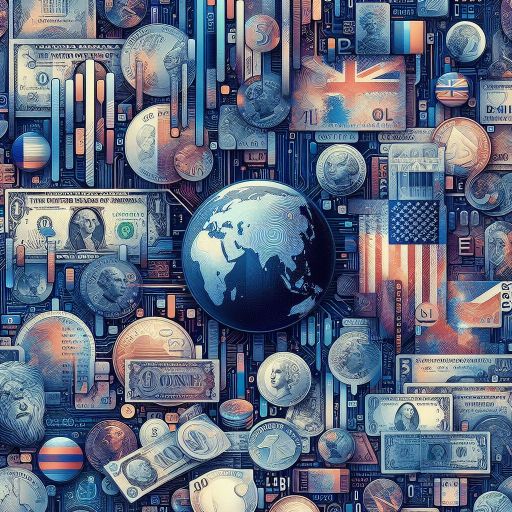Understanding the Forex Market - A Global Playground for Currency Traders
As the world’s largest financial market, the foreign exchange or forex market covers banks, commercial businesses, central banks, investment management firms, hedge funds, retail forex brokers, traders, and investors. Let’s take a deep dive into what the forex market is, who the participants are, and how trading works among the different participants.
Overview
●The forex market enables participants, ranging from banks to funds and individuals, to exchange currencies for hedging and speculative purposes.
●The market runs 24 hours a day, five days a week, and generates trillions of dollars in trading volume every day.
●The forex market is an over-the-counter (OTC) market, meaning it has no centralized exchange.
●One can open a forex account for as little as $100.
●Forex trading comes with the promise of high returns or substantial losses.
What does the forex market consist of?
No single market exchange dominates the forex market. Instead, it is dominated by a global network of computers and brokers the world over. Here, forex brokers are the market makers. But they may also post bids and ask prices for a currency pair that differs from the market’s most competitive bid.
Additionally, the Forex market is an over-the-counter (OTC) market where trading occurs without the need for a single centralized exchange. The currencies move between the trading parties with the support of brokers, who make the process possible.

What are currency pairs in forex?
A currency pair is the quotation and pricing structure of the currencies traded in the forex market. Their value is driven by economic, political, and environmental factors, such as wars, natural disasters, or national elections.
In other words, a currency pair is the quotation of two different currencies, with the value of one currency being quoted against the value of the other. The first listed currency in the pair is called the base currency, while the second currency is called the quote currency.
The currency pair tells us how much of the quoted currency is needed to buy one unit of the base currency.
Currencies on the forex market are identified by the three-letter ISO currency codes, which are respectively given to the two currencies in a currency pair (e.g., USD/EUR). These currency codes are used worldwide to denote the different currencies.
History of the Forex Market
Before World War I, most countries attached their currencies to specific amounts of gold, silver, or both. However, the system collapsed following the cataclysmic wars of the 20th century.
In 1944, the Bretton Woods agreement established the International Monetary Fund (IMF) and the International Bank for Reconstruction and Development (IBRD), also known as the World Bank. The agreement also established the General Agreement on Tariffs and Trade (GATT), which later became the World Trade Organization in 1995.
Under the Bretton Woods system, the value of the world’s currencies was pegged to the U.S. dollar, which was in turn pegged to the price of gold.
The U.S. government promised to buy any amount of gold from its monetary authorities at $35 per ounce. However, in August 1971, U.S. President Richard Nixon announced the suspension of the dollar's convertibility into gold, which was supposed to be temporary.
This seemingly minor development marked the dawn of the free-floating system of currencies that exists today. Currencies now effectively choose their own benchmarks, and their values are determined by the supply and demand in the foreign exchange markets.
Types of Forex
The three main types of forex markets are spot, forward, and futures markets.
●Spot Forex Market
The spot market, also known as the cash market, is the most common trading instrument in forex. It is the underlying market where currency pairs are exchanged and valued. When you hear about the forex market as a whole, the spot market is what market participants are referring to.
Fellow forex traders, retail traders, banks, corporations, central banks, hedge funds, financial managers, and forex brokers are some of the key players active in the spot forex market.
●Forward Forex Market
Forward markets involve the exchange of a currency pair at a specified future date and at a predetermined price. Forward contracts are non-standardized financial contracts entered into between two parties and are tailor-made for settlement at a future date.
One of the key differences between spot and forward contracts is that the cash does not change hands at the time the two parties agree to the contract. Hedging transactions and speculative trading are the two primary reasons for entering into a forward contract.
●Future Forex Market
Futures operate in a similar manner to forward markets, but they are more standardized, and the counterparty is no longer a counterparty; their risk is transferred to the clearinghouse, i.e., futures exchange. Futures are very liquid relative to the cost of the instrument.

Advantages of Trading in the Forex Market
A key advantage of forex trading is the absence of rules and regulations; it is not restricted to a particular time and place, making it a decentralized market. The daily trading volume is enormous, estimated to be more than 3 trillion dollars.
The forex trading market is also open 24 hours a day, five days a week. This provides more opportunities for people with regular nine-to-five jobs because they can participate outside of regular working hours.
The currency market allows traders to trade in numerous currency pairs. This means traders do not run out of options and can make trades in many types of agreements, including spot or futures. The transaction cost of trading in the forex market is also very low compared with trading in other financial markets.
Traders can also get high leverage on margin trading. High leverage can work for the benefit of traders by increasing their chances of making a profit, but it can also work against them and increase the amount of their potential loss.
Conclusion
Forex trading has many advantages over other markets, including its flexible contract types and the fact that you can trade around the clock from Monday through Friday. With technological advancement, accessibility to forex markets around the world has improved with the introduction of online platforms.
OTHER NEWS
-
- 5 Ways Traders Can Smartly Invest in Bitcoin
- By Prodosh Kundu 15 May,2024

-
- Navigating the Pros and Cons: A Comprehensive Guide to Buying Newly Built Homes!
- By Wendy 20 Nov,2023

-
- What are the Steps Required to Purchase Life Insurance?
- By Wendy 24 Apr,2023

-
- Do you have all 5 types of insurance you need to live in the USA?
- By Anna 24 Apr,2023

-
- If you had Enough Money, Which Country Would you buy a House in?
- By Little Grapes 24 Apr,2023

-
- Understanding Reinsurance: How it Benefits the Insurance Industry and Consumers.
- By Wendy 30 May,2023

-
- How do I buy Auto Insurance?
- By Little Grapes 24 Apr,2023

-
- How do I buy Insurance?
- By Little Grapes 24 Apr,2023

-
- Will House Prices Fall in 2023?
- By Wendy 07 Aug,2023

-
- Discover the Best Citibank Credit Cards for Your Lifestyle and Spending Habits!
- By Wendy 24 Apr,2023

-
- How to buy the Right Insurance for you!
- By Little Grapes 24 Apr,2023

-
- When a Couple Buys a House Together, who is Better to Choose as the Primary Lender for the Loan?
- By Little Grapes 24 Apr,2023

 1
1 1
1